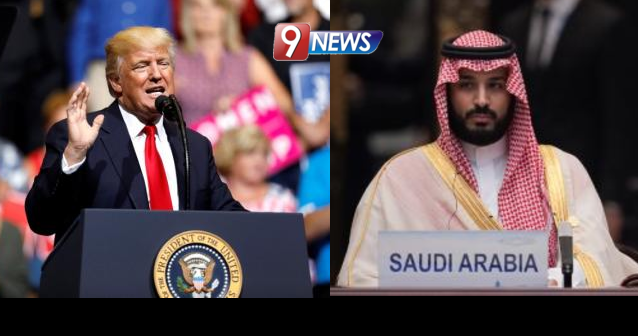
By Yara Bayoumy and John Walcott
WASHINGTON (Reuters) – Saudi Arabia’s new crown prince and likely next king shares U.S. President Donald Trump’s hawkish view of Iran, but a more confrontational approach towards Tehran carries a risk of escalation in an unstable region, current and former U.S. officials said.
Iran will almost certainly respond to a more aggressive posture by the United States and its chief Sunni Arab ally in battlefields where Riyadh and Tehran are engaged in a regional tussle for influence.
Saudi King Salman made his son Mohammed bin Salman next in line to the throne on Wednesday, handing the 31-year-old sweeping powers, in a succession shake-up.
Prince Mohammed, widely referred to as “MbS,” has ruled out any dialogue with arch rival Iran and pledged to protect his conservative kingdom from what he called Tehran’s efforts to dominate the Muslim world.
In the first meeting between Trump and MbS at the White House in March, the two leaders noted the importance of “confronting Iran’s destabilizing regional activities.”
But that could have unintended consequences, said some current and former U.S. administration officials.
The greatest danger for the Trump administration, a longtime U.S. government expert on Middle East affairs said, was for the United States to be dragged deeper into the Sunni-Shi’ite conflict playing out across the Middle East, a danger that could be compounded by Trump’s delegation of responsibility for military decisions to the Pentagon.
If the administration gives U.S. commanders greater authority to respond to Iranian air and naval provocations in the Gulf and Strait of Hormuz, things could easily spiral out of control, the official said.
U.S.-backed forces fighting in Syria are also in close proximity with Iranian-backed forces supporting Syrian President Bashar al-Assad. U.S. military jets twice this month shot down Iranian-made drones threatening U.S. and coalition forces in southeastern Syria. The United States also supports the Saudi-led coalition’s war in Yemen through refueling, logistics and limited intelligence assistance.
“If we were to witness an incident at sea between an Iranian and a U.S. vessel in the Gulf, at a time of immense distrust and zero communication, how likely is it that the confrontation would be defused rather than exacerbated?” said Rob Malley, vice president for policy at the International Crisis Group.
“If there’s a more bellicose attitude towards Iran, Iran is likely to respond,” said Malley, a former senior adviser on Middle East affairs under President Barack Obama.
Eric Pelofsky, who dealt with Middle East issues at the White House under Obama, said the administration had “labored pretty hard to avoid a direct clash between Saudi Arabia and Iran on the high seas,” in part because it would expand the Yemen conflict and there were questions “about what the outcome of such an encounter might be.”
But Luke Coffey, director of the Foreign Policy Center at the Heritage Foundation, a conservative think tank, doubted Iran would retaliate in a major way.
“Iran has very limited ability or options to retaliate against U.S. forces in the region without suffering an overwhelming U.S. response,” Coffey said.
“I think Tehran knows this so they will stick to low-level tactics like harassing U.S. ships in the Gulf. This will be just enough to be annoying but not enough to be considered ‘retaliating,'” he said.
CLOSE RELATIONSHIP
MbS was the driving force behind the Saudi-led campaign in Yemen against Iran-allied Houthi rebels, launched in March 2015. He also appears to have orchestrated this month’s breach with neighbor Qatar, which was accused by Riyadh and three other Arab states of cozying up to Iran, funding terrorism or fomenting regional instability. Qatar denies the allegations.
“There’s a danger that his foreign policy instincts, that do tend to be aggressive, especially toward Iran, but also toward Sunni extremism, might end up distracting from what he wants to get done economically,” said a former Obama administration official, referring to “Vision 2030,” MbS’s signature economic and social reform agenda.
Malley, who has met MbS, said his attitude toward Iran “stems from his strongly felt conviction that for too long the kingdom has been a punching bag, a passive witness to Iranian action, true or assumed, in Iraq, Syria, Yemen, Bahrain and Saudi Arabia’s own eastern province.”
“His view is that Saudi Arabia absorbed those blows and now there’s no reason to absorb them anymore,” Malley said.
That dovetails neatly with Trump who has said Iran promotes evil and is a key source of funding and support for militant groups. MbS has also developed a close relationship with Trump’s influential son-in-law, Jared Kushner, who at 36 is close in age to him.
MbS’s “desire to confront or even defeat Iran has appeal in the White House, where the crown prince has done an admirable job forging a relationship with the Kushners, who are of his generation,” said the U.S. official.
Kushner and his wife, Ivanka Trump, had dinner with MbS when the U.S. president visited Riyadh last month, the first stop on Trump’s maiden international visit.
Another senior administration official told Reuters that while Washington did not have advance warning of MbS’s promotion, it could see it coming. “This is why the president has tried to foster good relations with him,” the official said.
(Additional reporting by Jonathan Landay, Phil Stewart and Steve Holland; Writing by Warren Strobel and Yara Bayoumy; Editing by Leslie Adler)